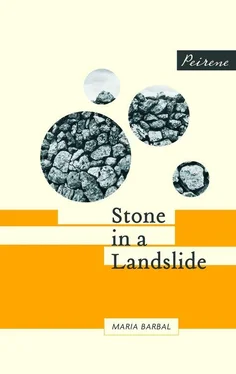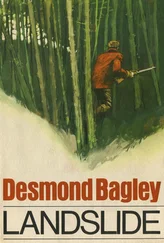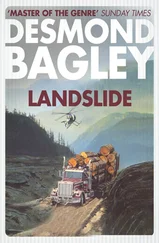I could see that I wouldn’t get away from my partner easily. But as soon as he arrived, Jaume made it so simple by laughing as if we’d always known each other and saying: Now it’s the turn of the boys from Sarri to dance with the girls of Pallarès! Martí was taken aback but didn’t have time to answer because I was already spinning around the room with Jaume. His face was so sour that I didn’t dare look at him standing there rooted to the spot.
We didn’t stop dancing all night. The wind whistled outside and it must have been very cold but the back of my neck was drenched in sweat. When I saw that Old Tonet was packing up his accordion, I stopped. I could hardly breathe. The night was black as pitch and I felt that some kind of miracle had happened. It touched my eyes, my lips… Only when I felt the icy air outside did I wake up and then, as if it was any old thing, he said if I wasn’t against the idea I should tell my family that he wanted to marry me and that he would return on Sunday evening to find out the answer.
It was six steps from the schoolroom to the door of my home. The walls touched to form one of the corners of the plaza. I was in front of the steps that I’d come down a few hours ago and I didn’t recognize myself. I wanted to force myself to believe that I was the Conxa who’d come to Pallarès to live with my aunt and uncle. But that meant nothing to me. Now I could only be Jaume’s Conxa. The mad joy that I felt didn’t make me run around though. Instead I was very still, unable to move from the bottom step where we said goodbye, however much the freezing handrail made me want to go up the stairs.
All I longed for was to go a few moments or half an hour or so back in time, to remember. And feel his presence at my side again. I could still hear people talking nearby and instinctively I raised my head. Jaume smiled at me from the other end of the plaza and waved goodbye. Then I ran as fast as my legs could carry me up the steps. I didn’t feel part of this world: it felt as if I was dreaming.
The tears I cried because they wouldn’t let me marry Jaume became a distant memory. In the end good sense had won out. There was no reason for us not to marry. But behind the few words spoken on the matter, my aunt and uncle had taken a lot of things into account.
The chance of making a better match with Martí Sebastià or others, the fact they were my guardians, Jaume’s humble position as a tradesman…
But everyone knew that at the Sebastiàs there was a lot of land and little inclination to work: the father was an idiot, the mother was bossy and as for the son, he didn’t like to lift a finger. We’ve already talked about the son. He was a bewildered boy, always clutching his mother’s skirts like a little child. And besides all that, they ate like pigs. It would take a very particular young woman to fit into their house. My aunt and uncle understood this. And there was another thing in our favour: I was their ward and would inherit from them, and because Jaume wasn’t going to inherit any land, he could come to live in Pallarès. At first it was a problem that he wasn’t fully devoted to the land, but he got round this by promising my aunt and uncle that he would help with the heavy summer work — the harvesting, reaping and threshing — but would be a builder in the winter, wherever there was work for him. They would take charge of the money he earned and he would also fix up the whole house, which was badly in need of repair.
As tempers cooled, what had looked like a bad deal at first gradually began to seem more attractive to my aunt and uncle. I think promising to let them handle the money made up their minds. At that time, there was hardly any money in the villages. It was only ever seen when livestock was sold.
I don’t mean to say that it was a purely commercial arrangement, because I know that my unhappiness and silence after the initial refusal helped to calm the storm. Tia had not married a man much older than her in vain and she must have been sensitive to the love between two young people. Maybe she was cleverer than she let on and could see that with my spirits so low I was capable of going along with Jaume’s desire to set up home on our own.
But I felt bound by gratitude to my aunt and uncle, especially to Tia. Oncle was a shrewd man, who didn’t say much, good or bad, a man of routine, who seemed content to live with his wife’s lively, enterprising spirit. He left most things to her except overseeing the work in the fields and trading livestock. He was a man of few friends and relations and because he was a hard worker and not in the least conceited, equally had no enemies.
Tia had been almost entirely responsible for everything to do with me and the thought of leaving made me feel guilty. Perhaps deep down I was afraid of losing what I’d learnt to own. Jaume accepted my inability to feel free and he tied himself, with me, to the land and two people who were used to doing as they pleased. But it is fair to say that in those days love made up for any sense of being tied down.
The heat had come again. It was June 1921. The meadows were golden and the poppies were in full bloom. The buzzing of flies looking for food could be heard everywhere. The wild hazel and walnut trees were turning green near the river, like the poplars. The mountain was an ants’ nest of workers moving between yellow and green, of carts on the earthen tracks and of the whistles of tools hacking mercilessly into slender stalks. The earth was becoming spongy from the stream that had to last it a whole year. Only the squeak of the cork from the jug or the barrel raised the farmers’ eyes to the sky briefly.
Mowing left me tired, but I would run home through the meadows with my breasts leaking inside my blouse to feed Elvira. It nearly killed me. I would always be anxious as I ran — she must be crying, I thought — even though if I was late, I knew Tia would give her a bit of bread dipped in milk. But she wanted only her mother — everyone said she cried to be with me, not because she was hungry. She had so little of me in her first summer. So many hours had to be spent working outdoors! Jaume sometimes signalled to me to go home and I did, but I was afraid that Oncle might notice and grumble. And so I went from one place to the other like a fugitive, from Elvira to work and work to Elvira. Looking back now, I see that there was a lot of toing and froing. But Jaume’s constant support gave me strength and pushed me towards the most important thing: our daughter. He would say: people are more important than anything else. I needed help to see this because I had been taught the opposite. When the land and animals were taken care of, then you turned to people.
Jaume was impatient with routine and old habits, but he was careful to steer clear of quarrelling with my aunt and uncle. We’d endured enough before marrying. The desire to avoid scenes made us treat them with greater respect, even if sometimes we had to bite our tongues. I was grateful that Jaume behaved like this. And he was quick to smile and say he was the happiest he’d ever been, happy to be young, in love and a father.
Elvira was born just days before our first anniversary. It was the 18th of November and Jaume had a job in Montsent. As she was born on a Tuesday, he didn’t know about it until Anton Peret went there on Friday. He left everything immediately and as night fell he came up on foot through the snow which had frozen on the roads. No one expected him until Sunday.
How happy it made me to see his red face appear from under his muffler hours after night had fallen! He hugged me tightly, then went straight to look at the little girl sleeping in the cradle nearby. He didn’t say a word but came close to me again and took my hands. The contrast between warm and cold soon disappeared. For a time we couldn’t say anything. I told him all about the birth, though in quite a muddle and with a few tears. He found it strange that he’d lived three days without knowing he had a daughter in the world. He felt a bit cheated. After a while he kissed me and left promising to drink a bowl of warm milk. He wouldn’t allow me to get up and prepare it for him. He walked back to Montsent all night in time to be at work at daybreak.
Читать дальше












